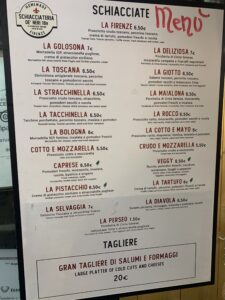Moving to a new country can be extremely daunting, and comes with a whole bundle of daily culture shocks. Adding a whole new language into the mix can make things even more challenging. Before coming to Italy, I knew very little Italian but made it my goal to learn as much as I could out of respect to locals and in the hopes of reconnecting with my grandmother’s heritage. Here are some methods that helped me familiarize myself with and improve upon my Italian speaking and understanding. In bocca al lupo!
1. Watch videos and podcasts before departing.
One method that really gave me a head start on the language was to watch YouTube videos. This helped me learn how to pronounce Italian words and recognize them in speech, and taught me some of the basic grammar and vocabulary. If you are going to Italy, I highly recommend Italy Made Easy’s podcasts and videos, especially their free Beginner Italian Course YouTube playlist.
The teacher does a fantastic job explaining Italian to English-speaking beginners and is very engaging. Around the same time I was watching their videos, I also changed my phone’s language to Italian to experiment with immersion, though it was only electronic. It made things a little confusing at times, but it helped me learn some vocabulary and get used to being surrounded by a different language.

Here is a stand at the Mercato Centrale (Central Market) in Florence. During our first week, SAI provided a market tour during which we tried some of their cheeses with jam and meats.
2. Take advantage of any crash courses and tours SAI offers.
During my first week in Italy, I attended as many SAI activities as I could, which thankfully included a few tours of Florentine markets and neighborhoods as well as a super helpful “Survival Italian” session with a sweet Italian lady. These activities are amazing because they help you gain some familiarity and feel a little more comfortable in your new home.
3. Practice using simple phrases with shop owners.
I always try to use Italian with cashiers, store owners, and restaurant staff. I make mistakes often, and sometimes they respond in English because they recognize I am American, but I still try. Each awkward moment is a learning experience, and there is no way to improve without practicing with real humans. You will mess up, but that’s okay! Most people understand English at least at a basic level. They are extra willing to help you out if you make the effort to try to speak their language.

This semi-comic book was one of my favorite finds in a bookstore next to the Duomo: a super entertaining story about a few dino friends trying to escape a bigger dinosaur while running into some silly problems.
4. As you walk around, read and make inferences!
Of course, most signs are in the country’s official language. However, many areas with large tourist populations, such as Florence, have frequent English translations. This is helpful when you need to understand things easily, but it can also help you learn. Reading both languages of signs, menus, labels, etc. can help you expand your vocabulary.
Another creative method I used to expand my vocabulary was to watch my favorite TV show using Italian audio and English subtitles. This helped me work on my listening skills while knowing what the characters were saying.
Additionally, I had even more fun when I was in a bookstore one day and out of curiosity tried to read Italian children’s books. The vocabulary and grammar were basic since they were meant for kids, plus the content was very sweet and nostalgic.
5. Listen to and copy what the locals say . . . as long as you know what it means!
When you overhear locals’ conversations, try to pick out some words to work on your recognition. I highly recommend spending time with locals, whether that means at bars or through volunteering or other organizations. I highly recommend living with a host family. I am so grateful I chose this option for a multitude of reasons, but one of these is that they help me speak and understand Italian much better than I would have been able to on my own, and often introduce me to their local friends. Listening to their conversations helps me work on my comprehension and I try to respond in Italian when I can.
6. If possible, enroll in at least one language course.
Of course, it is helpful to be in a class that forces you to boost your vocabulary on a daily basis. I took beginning and intermediate Italian classes during my first two months in Florence, and they helped so much. I wish I had the time to take more classes because they helped so much. I highly recommend this!

This menu is a great example of a bilingual sign that you can use to expand your vocabulary. learn from. (In Florence, most restaurants post their menus outside so that you can decide whether you wish to order from there.)
Written by: Makena, Fall 2023 Florence student from Point Loma Nazarene University


Comments
No comments yet